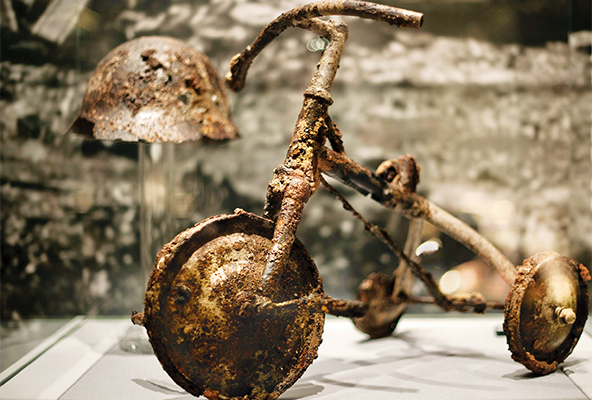THIS AUGUST MARKS 80 years since U.S. president Harry Truman issued orders to drop atomic bombs on the Japanese cities of Hiroshima and Nagasaki. The impact was so terrible that no head of state has done so since. Yet, eight decades later, 12,000 nuclear weapons are deployed around the world — a veritable apocalypse-in-waiting.
The twin existential threats of nuclear weapons and climate change interact dangerously.
While many people are accustomed to thinking of climate change as our existential threat, we may overlook that nuclear arsenals are the first global threat entirely of humanity’s own making.
The combined nuclear arsenals of the United States, Russia, France, the United Kingdom, and China continue to pose profound dangers to our planet. Taking note of this nuclear hegemony, Israel, India, Pakistan, and North Korea have built smaller nuclear arsenals to threaten their neighbors. The U.S. and Israel’s illegal attacks in June against Iran, ostensibly to prevent Iran from developing nuclear weapons, are likely to have the opposite effect.
The twin existential threats of nuclear weapons and climate change interact dangerously. The production and upkeep of its nuclear arsenal helps make the U.S. military one of the largest institutional polluters in the world. Addressing the destructive entanglement of nuclear threats, environmental degradation, and climate instability invites prophetic imagination and practical commitments to increase our collective actions for peace.
Since the beginning of the nuclear era, many Christians have worked to end this catastrophe-in-waiting. The first meeting of the World Council of Churches (WCC) in 1948 addressed this issue by noting that “the discovery of atomic and other new weapons renders widespread and indiscriminate destruction inherent in the whole conduct of modern war.” Since its earliest days, the WCC has demanded an international treaty to outlaw nuclear weapons. The Catholic Church too has long opposed any use of nuclear weapons.
People have taken actions, small and large, to abolish nuclear weapons and show solidarity with the victims. In the 1990s, the Sahtu Dene First Nations people in Canada learned that uranium mined on their traditional lands was used in the bombs dropped on Japan in 1945. They sent a delegation of elders to Japan to apologize to the people of Hiroshima and Nagasaki.
In 2009, thanks in part to advocacy by the WCC, Burundi ratified the Treaty of Pelindaba, which brought the African Nuclear-Weapon-Free Zone into force. Africa joined other such zones in Latin America and the Caribbean, Southeast Asia, the South Pacific and Central Asia, plus Mongolia and Antarctica. The entire Southern hemisphere has agreed not only to refrain from developing or buying nuclear weapons but also to prevent nuclear testing or radioactive waste dumps in their territories.
In 2021, after decades of building support, the Treaty on the Prohibition of Nuclear Weapons (TPNW) became a binding legal instrument that bans nuclear weapons. The International Campaign to Abolish Nuclear Weapons won the Nobel Peace Prize for its support of the treaty and for outlining the catastrophic humanitarian consequences of these weapons. The Holy See was the first state to ratify the TPNW. Pope Francis advanced the Catholic Church’s teaching by condemning even the possession of nuclear weapons. Today, nearly 100 countries have signed the TPNW, part of the global majority of nations that reject nuclear arsenals. Support for this historic treaty continues to grow.
Pro-nuclear weapons states, however, show little interest in the denuclearization movement. The specter and logic of “mutually assured destruction” continues as the status quo, as if it offers true security. Even that slim balance now unravels in the war against Ukraine. Last year, Russian president Vladmir Putin revised his nation’s nuclear-use policy to lower the threshold for use. As people of God, our moral imperative is to raise the threshold as high as possible until all such weapons are put beyond use and finally eradicated completely.
“Prophetic imagination,” as the late biblical scholar Walter Brueggemann taught, means that “prophets are able to imagine the world other than the way that is in front of them.” This is strong guidance for nuclear disarmament work. We must be steadfast.
There is a Japanese Buddhist denomination active in exercising its commitment to peace. What would these Buddhists do, I asked one of their leaders, if the government of Japan acted on what it has prepared to do for many years and went ahead with the development of nuclear weapons? “We wouldn’t let them,” this Buddhist leader replied, firmly and without hesitation.
Prophetic witness and courage are our way forward. This spring, an interreligious group of some 100 organizations brought a message to the parties to the Treaty on the Prohibition of Nuclear Weapons gathered at the United Nations. “Nuclear faith is a faith that secures death,” they said. “We want to pursue a faith that leads to life.”

Got something to say about what you're reading? We value your feedback!







